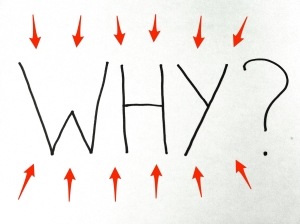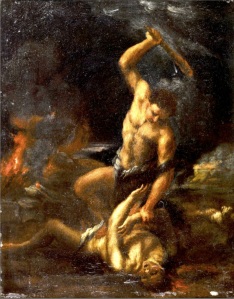Sabbath Reflection for September 12 (’14)
Text: Genesis 4
I wonder how many people give generously in churches worldwide.  “Tithe”, of course, refers to 10% and not strictly to giving generally or generously. Many churches face annual budget short-falls (my home church is no exception, and it happens the same time of year). It is not because the economy is bad necessarily. That may be true from time to time when a significant number of members lose their jobs. Usually, however, it is simply a matter of a heart that doesn’t want to give. When enough hearts don’t want to give, the worship of God is reduced or deadened for all and the work of God is restricted and lessened.
“Tithe”, of course, refers to 10% and not strictly to giving generally or generously. Many churches face annual budget short-falls (my home church is no exception, and it happens the same time of year). It is not because the economy is bad necessarily. That may be true from time to time when a significant number of members lose their jobs. Usually, however, it is simply a matter of a heart that doesn’t want to give. When enough hearts don’t want to give, the worship of God is reduced or deadened for all and the work of God is restricted and lessened.
The first recorded instance of human giving is found in Genesis 4. Two brothers, Cain and Abel, bring a gift to Yahweh, their covenant Lord. It was he who made the earth and they knew it. He was the one who covered their parents’ shame, gave them mercy when deserving of none, and limited judgment when they earned absolute and final judgment. They knew Yahweh was what he would later reveal himself to be to Moses and Israel:
Yahweh descended in the cloud and stood there with him as he called upon the name of the Yahweh. Then Yahweh passed by in front of him and proclaimed, “Yahweh, Yahweh God, compassionate and gracious, slow to anger, and abounding in loving-kindness and truth; who keeps loving-kindness for thousands, who forgives iniquity, transgression and sin; yet He will by no means leave the guilty unpunished, visiting the iniquity of fathers on the children and on the grandchildren to the third and fourth generations” (Ex 34:6-7).
This was the one to whom they owed obedience and faith. Cain had a problem with both. Yahweh required obedience borne from faith, so the fuel of conflict is present.
The critical verses of Genesis 4 for today’s post are 4:3-5, and 8. I’m leaving out Yahweh’s response to Cain in 6-7 not because it isn’t relevant, but so Cain’s actions can be highlighted as a complete disregard for Yahweh and his word, some of which comes in 6-7.
In the course of time Cain brought to Yahweh an offering of the fruit of the ground, 4 and Abel also brought of the firstborn of his flock and of their fat portions. And Yahweh had regard for Abel and his offering, 5 but for Cain and his offering he had no regard. So Cain was very angry, and his face fell….8 Cain spoke to Abel his brother. And when they were in the field, Cain rose up against his brother Abel and killed him.
 These verses teach us a great deal about Cain and how worship and generosity are joined in such a way that one leads to the other and a lack of one reveals a lack of the other. Cain and Abel both bring offerings. Only one was accepted. Why? And why would he seem to give the over-reaction of the universe (to this point in history, at least) by murdering Abel?
These verses teach us a great deal about Cain and how worship and generosity are joined in such a way that one leads to the other and a lack of one reveals a lack of the other. Cain and Abel both bring offerings. Only one was accepted. Why? And why would he seem to give the over-reaction of the universe (to this point in history, at least) by murdering Abel?
Start with Cain’s offering. Raising sheep and growing plants takes a while. I live in ideal conditions for both in Mississippi. It still takes me a good 3 months to get produce to ripen “just so.” The text says they both brought offerings, and Abel’s would certainly have taken longer since his required husbandry and breeding. So two men are spending day-in and day-out working their respective fields as best they can in order to have a harvest both ways. “In the course of time” they bring what their hard work has rewarded, but what they bring makes the difference and reveals their very different hearts. 4:3 says Cain “brought to Yahweh an offering of the fruit of the ground.” Sounds nice, right? But look at what Abel brought: “…and Abel also…the firstborn of his flock and of their fat portions.” What’s the big deal? What’s so important? By bringing the firstborn of the flock, Abel had no promise his flock would ever grow. After offering the firstborn, maybe a bear or lion or other predator, disease, famine, cold-snap, heat-wave, tornado, hurricane, flood, fire, or just getting lost-ness would claim the lives of the rest of his flock. He had no assurance his flock would ever have more babies. Abel, then, was threatening himself not only with unemployment, but with a total loss of his ability as a shepherd to care for himself. By offering the firstborn, he was offering his entire future. By offering his firstborn, he was offering himself.
 Cain offers no such offering. He simply brings some fruit. Old Testament narrative is wonderful like this. It requires much thought sometimes to see what is plain as day. The details are all there. There simply is no commentary saying, “Abel gave all he had; Cain kept back the first produce for himself and gave God ‘secondsies’.” But that’s what he does. Cain has no faith. He operates out of duty. Abel operates out of delight. Cain doesn’t believe Yahweh is worth his future. Instead, he believes he himself is responsible for protection, his future, and his needs. Abel believes in every way differently than his brother. This is why he is accepted and Cain is rejected. Yahweh’s response even confirms this (v. 7), “If you do well, will you not be accepted? And if you do not do well, sin is crouching at the door. Its desire is for you, but you must rule over it.” So this is Cain’s offering. What of his reaction?
Cain offers no such offering. He simply brings some fruit. Old Testament narrative is wonderful like this. It requires much thought sometimes to see what is plain as day. The details are all there. There simply is no commentary saying, “Abel gave all he had; Cain kept back the first produce for himself and gave God ‘secondsies’.” But that’s what he does. Cain has no faith. He operates out of duty. Abel operates out of delight. Cain doesn’t believe Yahweh is worth his future. Instead, he believes he himself is responsible for protection, his future, and his needs. Abel believes in every way differently than his brother. This is why he is accepted and Cain is rejected. Yahweh’s response even confirms this (v. 7), “If you do well, will you not be accepted? And if you do not do well, sin is crouching at the door. Its desire is for you, but you must rule over it.” So this is Cain’s offering. What of his reaction?
Cain’s reaction is one of anger. Again, this is extremely telling. He doesn’t respond with sincere curiosity, “Why was I rejected, Yahweh?” He doesn’t respond with godly introspection, “What have I done?” He doesn’t respond with repentance, “I know exactly what I have done. Have mercy on me, a sinner.” He just gets real mad. It’s the kind of anger infected with envy and jealousy, too, because it leads to a wicked calculation.
Cain calculates that he can eliminate the well-loved and genuinely faithful Abel through brotherly manipulation. “Cain spoke to Abel” (v. 8) his brother “Come out to the field with me, brother,” perhaps as  they had done on hunting or hiking trips many times before. Whatever was said, Abel suspected nothing. Cain, then, knew exactly what he was going to do yet was completely convincing that he wasn’t. The text doesn’t present Abel as naive. It presents Cain as evil. Remember, there had never been murder to this point. Death, yes, especially in the animal kingdom (for Yahweh had killed animals to clothe their parents’ shame and guilt). But Abel never suspected what was in Cain’s heart. Cain’s heart had grown so cold and evil he was able to convince his brother of good intentions, then strike him down.
they had done on hunting or hiking trips many times before. Whatever was said, Abel suspected nothing. Cain, then, knew exactly what he was going to do yet was completely convincing that he wasn’t. The text doesn’t present Abel as naive. It presents Cain as evil. Remember, there had never been murder to this point. Death, yes, especially in the animal kingdom (for Yahweh had killed animals to clothe their parents’ shame and guilt). But Abel never suspected what was in Cain’s heart. Cain’s heart had grown so cold and evil he was able to convince his brother of good intentions, then strike him down.
What does this have to do with giving? I do not think giving generously is the primary point of this passage. Maybe not even secondarily. However, Genesis 4 begins with two brothers, both of whom are givers. One gives his best by giving his hopes and dreams, his firstborn, his future, but the other gives what he believes he doesn’t need. Quantity isn’t the punchline. Quality is.
As you worship on Sunday, remember this story. Consider what your own giving says about your faith and worship in the Living God, our Heavenly Father, his only begotten Son, Jesus, and the Holy Spirit.
Does your giving reduce and deaden worship (in your own heart or those of your church who cannot give praise at the generosity of the church)? Does your giving restrict and lessen the mission of the church? After all, nobody can turn on the lights without money, and even candles cost something. Don’t be like Cain. Have the faith of Abel. We began and will end this post with this to consider:
When enough hearts don’t want to give, the worship of God is reduced or deadened for all and the work of God is restricted and lessened.
Update: I had this article reviewed prior to publication, and an excellent objection was made to my post. I post the objection here in full:
The only [biblical] commentary on [Cain and Abel’s] gifts is in Hebrews 11:4, which states faith was the only difference. You are making the gift itself the point: “Cain …simply brings some fruit.” Each brought the work of his hands (“Now Abel kept flocks, and Cain worked the soil,” Gen 4:2), but only one had faith. I believe they could have switched gifts, and Abel’s would still have been accepted. As you know, some say it was the blood sacrifice that made the difference. I repeat: the only commentary on this text says faith was the variable.
 This objection makes an excellent point that faith was what made the difference, and I leave the reader to decide if my post downplays or highlights that faith is, indeed, what made the difference, and whether we have the same faith. Either way, we ought not forget that critical point regarding the presence, or absence, of faith and one’s acceptability to God.
This objection makes an excellent point that faith was what made the difference, and I leave the reader to decide if my post downplays or highlights that faith is, indeed, what made the difference, and whether we have the same faith. Either way, we ought not forget that critical point regarding the presence, or absence, of faith and one’s acceptability to God.
There you go: a behind the scenes look at how we do things around here.
[…] us these two sides most clearly. Cain, the seed of the Serpent, and Abel, the seed of the Woman. One has faith, one doesn’t. Cain hates the Abel and is absorbed in beating him, while Abel is absorbed with worship of […]
LikeLike